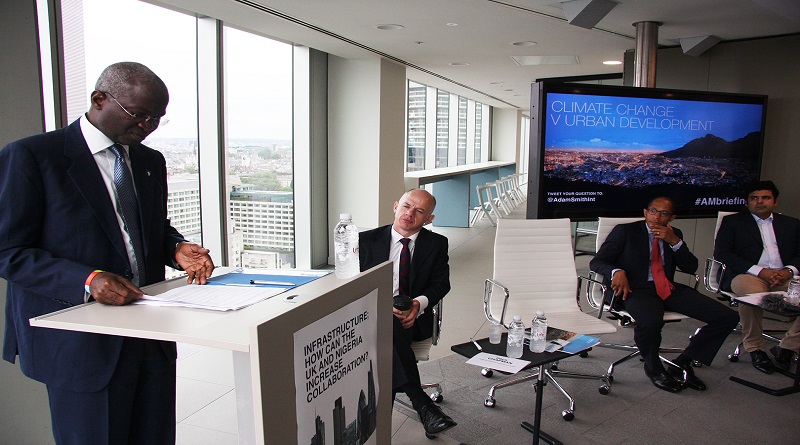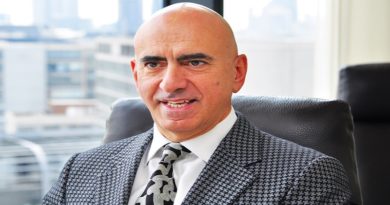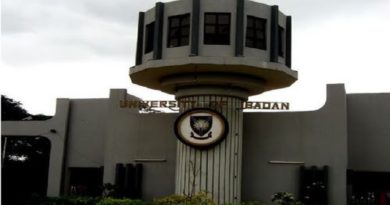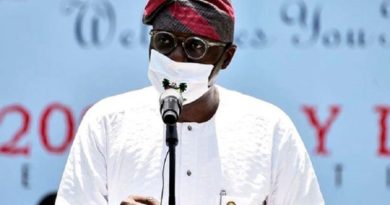Why UK, Nigeria need to partner on infrastructure-Fashola
With both countries currently facing peculiar challenges, Nigeria’s Power, Works and Housing Minister, Mr. Babatunde Fashola , has canvassed a partnership between the United Kingdom and Nigeria that would ensure infrastructural growth and prosperity for both countries.
In a Keynote address with the theme, “Delivering Infrastructure: Lessons for Nigeria and the UKâ€, which he delivered at a Forum organised by the Nigeria Infrastructure Advisory Facility at the headquarters of Adam Smith International in London at the weekend, Fashola said such partnership with Nigeria “in a relationship of shared prosperity†could be a useful way for the United Kingdom in her quest for growth after Brexit.
The Minister, who analysed the socio-economic import of the historical relationship between the UK and Nigeria, recalled that the past relationships between the two countries, especially in the early 20th Century, had been mutually beneficial in terms of infrastructural development and trade partnerships adding that the economies of both countries had been the better for it.
Describing the long relationship between the two countries as Partnership that has worked in the past, Fashola advocated, “a re-engagement with Nigeria†recalling that in the early 20th Century, when Nigeria’s infrastructure was developed by the UK, up to the 1970s when we were the UK’s largest trading partner, the economy of that country prospered.
Emphasizing on the need for the re-engagement as a plausible option in the aftermath of Brexit, Fashola, who noted that the modality for such re-engagement lay in the realm of policy and economic choices for the people and government of the UK, however, declared, “In the early 20th Century, when our infrastructure was developed by the UK, up to the 1970s when we were the UK’s largest trading partner, how did the UK’s economy fare?
“In that period our inter-state Rail was built by the UK, but today China is building our inter-city Rail in spite of a language barrier. But how is the UK economy faring compared to China?â€,he asked
The Minister, who noted that at the time the topic for the event organised by NIAF was chosen and the date was fixed, the EU referendum had not taken place, declared, “Now that it has and Brexit has occurred, my only recommendation is that in charting a way forward for renewed prosperity, UK must look back now to partnerships that worked in the past.
“The Nigerian market is bigger than what it was in the 20th Century but its needs are different and it is now a sovereign democracyâ€, he said .
On the importance of infrastructure to human survival and quality of life, Fashola, said the importance lay in the impact on their people adding, “Perhaps more than we have ever cared to talk about at the street level is the fact that it is infrastructure that determines our quality of lifeâ€.
“It is infrastructure that helps define how long and how well we live. It is definitive in the question of whether a child dies before five or lives up to 80 years. It is infrastructure that defines how long it takes to travel a fixed distance, in what comfort we do so, and at what cost to our disposable incomeâ€, he said adding that it also defines how far or how near a person has to look in order to acquire skills for survival.
According to the Minister, “It defines whether we are secure or insecure in our homes, communities, cities or countries. Infrastructure is certainly defining in whether natural disasters result in temporary displacement or snowball into a humanitarian disaster. Infrastructure is the big currency that no Central Bank prints but which all Financial Systems can support. Its sufficiency or dearth is a product of a choice between fiscal profligacy or fiscal prudence by a stateâ€.
“All of what I have said attempts to sum up the presence or absence of roads, bridges, hospitals and clinics, airports, seaports, ferry terminals, bus systems, bicycle lanes, traffic systems, Internet penetration, schools and universities, security apparatus, emergency response, drains, flood control systems, water supply, fire-fighting systems, telephone connectivity and, of course, electricityâ€, he said.
The Minister, who traced the cause of the “insufficient†and “aged†infrastructure in Nigeria, said at their most challenged stages, as described by a London tabloid recently, the Infrastructure in the UK was far better than what obtains in Nigeria.
He said except for Asia and a few European countries, that have managed to keep relatively smaller populations and are not migrant destinations, many of the world’s leading economies are struggling with aging infrastructure, the United Kingdom not excluded.
Painting the picture of the state of Nigeria’s infrastructure, Fashola, who quoted the Times of London in its Editorial of Saturday July 23, 2016 titled ‘Build and They Will Come.’: which respectively referred to the UK roads, broadband, airport and railway networks as congested, patchy, deficient and dysfunctional, said even at their present states, he would describe them as better than the Nigerian equivalents.
He declared, “Now, I have used that ‘patchy’ broadband, the ‘deficient’ airport, and ‘dysfunctional’ railway, and, without patronising the UK people or government, or putting down my own country, I will trade our airport, broadband and most of the road service for the UK onesâ€, adding, “It is not that Nigeria lacks infrastructure, it is simply that it is insufficient and has agedâ€.
Hinging the insufficiency of infrastructure to inability of subsequent administrations since the 1970s to develop and expand the existing ones, Fashola noted, “Since the great construction boom of the 1970s, and the maintenance of the early 1990s under the Petroleum Trust Fund, managed by President Buhari in an ad-hoc capacity during a very dark political period in Nigeria, our population has grown much faster than our infrastructureâ€.
“For example, in Lagos, the two bridges built in the 1970s and the third one in 1991, which connect the Island and the Mainland, have not been added to, in spite of two oil booms between 1992 and 2013. Between the late 1970s when Jebba and Egbin Power Plants were built by the Buhari and Babangida governments, no major power plant was commenced until early 2000, a period of over a decade and a half. But during that period, our population exploded in leaps and boundsâ€, he said.
According to the Minister, while conducting an overview on how things got to the current situation, “What is in the immediate past, between 2010 and 2015, is that oil prices soared and exceeded $100 per barrel, and we earned about $215Billion in that period. Today, we face challenging economic times. We have suffered consecutive negative growth and are economically experiencing a recessionâ€.
The Minister said the reason for the economic recession in the country was as a result of the profligate fiscal policy between 2010 and 2015, when Nigeria not only under-budgeted (N4 trillion) in the face of deficient infrastructure, but also compounded it “by providing 15 per cent for capital expenditure, which was under-funded†and 85 per cent for recurrent, which it “adequately fundedâ€.
He added, “If infrastructure drives growth as we have experienced from the Great Depression and the Marshal Plan, and lately fiscal stimulus in recent years, today’s economic recession is the result of yesterday’s policiesâ€, adding that “The Buhari government knows the cause and has designed the proper solution: fiscal stimulus and capital spendingâ€.
According to the Minister, “Sometime in March 2015, a little over a year ago, before the Buhari Government, a snap survey of four construction companies which I conducted revealed that they had laid off 5, 150 workers because Government was not paying these construction companies for work doneâ€.
“Since my assumption of office, in the Ministry of Power, Works and Housing, meetings with contractors in power, works and housing reveal that contractors have been owed 2-3 years. These are the seeds of Recession, planted and nurtured between 2013 and 2014â€, he said.




